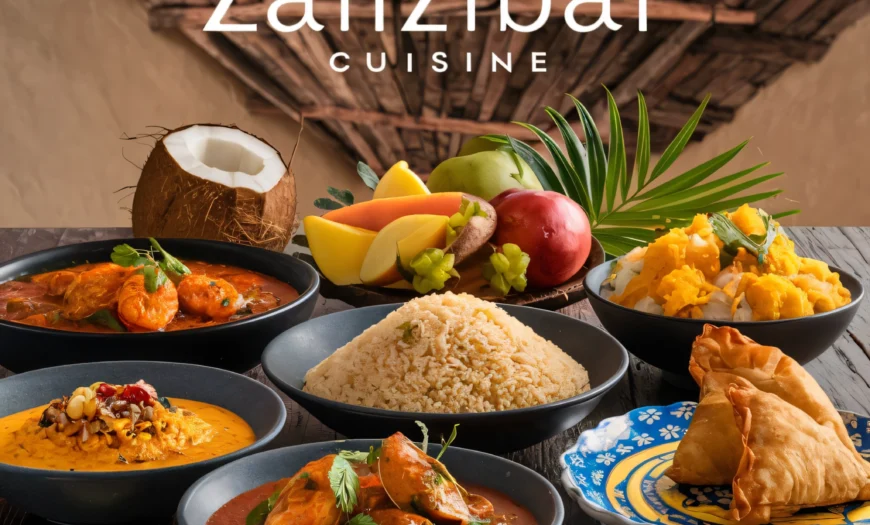Zanzibar, the enchanting spice island off the coast of Tanzania, is a melting pot of cultures, where the flavors of Africa, the Middle East, and India converge to create a truly unique culinary experience. At the heart of this gastronomic tapestry lies the rich and vibrant traditional Zanzibari cuisine, a testament to the island’s diverse heritage and the enduring traditions of its people.
The Enchanting Streets of Stone Town
As you step into the bustling streets of Stone Town, the historic heart of Zanzibar, the aromas of spices and sizzling dishes waft through the air, beckoning you to explore the island’s culinary delights. The narrow alleyways and historic buildings of Stone Town create a captivating backdrop for your culinary adventure, where the scents of spices mingle with the sounds of laughter and the hustle and bustle of daily life.
Stone Town, a UNESCO World Heritage site, is not just a feast for the taste buds but also for the eyes. The intricate wooden doors, ornate balconies, and coral stone buildings tell stories of the island’s rich history. As you wander through the labyrinthine streets, you’ll come across spice shops, local markets, and hidden gems of restaurants, each offering a unique taste of Zanzibari cuisine.
Urojo: The Quintessential Zanzibari Soup
One of the first dishes you’ll encounter is the quintessential Zanzibari delight, Urojo. Urojo, a flavorful soup, is a staple in Zanzibari households and a beloved street food. This tangy and spicy concoction is a medley of ingredients that reflect the island’s diverse influences. Gram flour, tamarind pulp, and coconut milk form the base, while a symphony of vegetables, from potatoes to lentils, add depth and texture. The real magic, however, lies in the aromatic spices and condiments that are added to the mix, including fresh hot chili and coconut chutneys, elevating the dish to a true sensory experience.
Urojo is more than just a soup; it’s a representation of Zanzibar’s cultural fusion. The use of gram flour showcases the Indian influence, while the coconut milk and local spices reflect the island’s African and Arab heritage. Eating Urojo is like taking a journey through Zanzibar’s history with every spoonful.
Pilau: The Aromatic Rice Dish
Another iconic Zanzibari dish that captures the essence of the island’s culinary heritage is Pilau. This aromatic rice dish is a staple in many Zanzibari households and is often served at special occasions and celebrations. The secret to the perfect Pilau lies in the blend of spices that infuse the rice, creating a fragrant and flavorful base. Chicken, beef, or even goat meat are often added to the mix, along with potatoes, onions, and garlic, resulting in a hearty and satisfying meal. The combination of spices, including cardamom, black pepper, cinnamon, and cloves, gives Pilau its distinctive and captivating aroma.
Pilau is more than just a dish; it’s a celebration of Zanzibar’s spice trade history. The island’s strategic location made it a crucial stop on ancient spice routes, and this influence is evident in every grain of Pilau rice. The dish is often served at weddings, Eid celebrations, and other festive occasions, symbolizing abundance and hospitality.
Biryani: A Blend of Cultures
While Urojo and Pilau are undoubtedly Zanzibari classics, the island’s culinary landscape is further enriched by the presence of Biryani, a dish that showcases the island’s historical connections to the Indian subcontinent. Zanzibari Biryani, or Biriani as it’s locally known, is a layered rice dish that features marinated meat or seafood, onions, garlic, ginger, and a medley of aromatic spices, including cumin, coriander, and cardamom. The result is a harmonious blend of flavors that pays homage to Zanzibar’s multicultural heritage. Biryani is a celebration of the island’s rich history, where the flavors of India meet the spices of Africa to create a culinary masterpiece.
The preparation of Biryani is an art form in itself. The meat is marinated for hours in a blend of yogurt and spices, then layered with partially cooked rice and slow-cooked to perfection. The result is a dish where each grain of rice is infused with flavor, and the meat is tender and succulent.
Zanzibar Pizza: A Street Food Delight
No culinary exploration of Zanzibar would be complete without mentioning the beloved Zanzibar Pizza, a local street food that has become a signature dish of the island. This thin, crispy crepe-like pastry is stuffed with a variety of fillings, from savory meat and vegetable combinations to sweet offerings like banana and chocolate. As you bite into the Zanzibar Pizza, you’ll be transported to the bustling streets of Stone Town, where vendors sell these delectable treats to hungry locals and curious visitors alike. The versatility of Zanzibar Pizza makes it a favorite among both locals and tourists, offering a unique twist on the classic pizza experience.
The creation of a Zanzibar Pizza is a spectacle in itself. Skilled vendors roll out the dough paper-thin, add the fillings, and then expertly fold and fry the pizza to crispy perfection. It’s a perfect example of how Zanzibari cuisine takes familiar concepts and transforms them into something uniquely local.
Street Food and Market Specialties
Beyond the well-known dishes, Zanzibar’s culinary landscape is dotted with a rich tapestry of street food and market specialties that offer a glimpse into the island’s vibrant food culture. One such delicacy is Mishkaki, grilled meat skewers that are marinated in a blend of yogurt, local spices, and citrus, resulting in a flavor-packed and tender treat. Mishkaki is a popular street food that can be found in markets and on street corners throughout Zanzibar.
Another standout is Chips Mayai, a unique fusion of French fries and a fluffy omelet, which has become a beloved street food staple. Chips Mayai is a testament to the creativity and innovation of Zanzibari cuisine, blending familiar ingredients in a new and exciting way.
For those with a sweet tooth, Zanzibar offers delights like Kashata, a sweet coconut candy, and Halua, a dense, sweet confection often flavored with cardamom and nuts. These treats showcase the island’s love for bold flavors, even in its desserts.
The Significance of Traditional Zanzibari Cuisine
The significance of traditional Zanzibari cuisine extends far beyond the plate, as it is deeply woven into the fabric of the island’s culture and community. Meals are often shared among families and friends, serving as a catalyst for social interaction and the preservation of cultural heritage. The act of preparing and sharing food is a cherished tradition that brings people together, fostering a sense of belonging and unity.
Whether it’s a family gathering, a community celebration, or a special event, food plays a central role in the lives of Zanzibaris. Dishes like Biryani and Pilau are often served at weddings, festivals, and other important occasions, symbolizing the importance of food in marking life’s milestones.
The preparation of traditional dishes is often a communal activity, with recipes passed down through generations. This oral tradition ensures that the flavors and techniques of Zanzibari cuisine are preserved and celebrated, even as the island embraces modernity.
Exploring the Culinary Landscape
As you delve into the culinary landscape of Zanzibar, you’ll not only savor the flavors but also gain a deeper understanding of the island’s rich history and the resilience of its people. Each dish tells a story, a
testament to the island’s ability to adapt and evolve, while still honoring its roots.
Whether you’re exploring the bustling Forodhani Night Market, wandering through the maze-like alleyways of Stone Town, or sitting down for a traditional Zanzibari feast, you’ll be captivated by the depth and diversity of the island’s culinary heritage. The Forodhani Night Market, in particular, is a mustvisit destination for food enthusiasts, where the streets come alive with the sights, sounds, and smells of Zanzibari cuisine.
For a truly immersive experience, consider taking a cooking class with a local chef. These classes often start with a trip to the market to select fresh ingredients, followed by hands-on instruction in preparing traditional dishes. It’s an opportunity to not only learn about Zanzibari cuisine but also to connect with local culture in a meaningful way.
The Spice Tours: A Culinary Adventure
No discussion of Zanzibari cuisine would be complete without mentioning the island’s famous spice tours. These tours take visitors to local spice farms, where they can see, smell, and taste the very spices that make Zanzibari cuisine so distinctive. From cloves and cinnamon to nutmeg and vanilla, these tours offer a sensory journey through the island’s spice heritage.
During a spice tour, you’ll learn about the cultivation and uses of various spices, both in cooking and traditional medicine. You might see how vanilla is pollinated by hand or learn to identify different spices by their leaves and bark. It’s an educational experience that provides context for the flavors you’ll encounter in Zanzibari dishes.
Conclusion: A World of Flavors
Zanzibar’s culinary journey is a symphony of flavors, where the spices of Africa meet the influences of the Middle East and India to create a truly unique gastronomic experience. From the tangy and spicy Urojo soup to the aromatic Pilau rice, and from the layered Biryani to the delectable Zanzibar Pizza, each dish is a testament to the island’s rich cultural heritage and the creativity of its people.
As you explore the culinary landscape of Zanzibar, you’re not just tasting food; you’re experiencing history, culture, and tradition. Each meal is an opportunity to connect with the island’s past and present, to understand the influences that have shaped its cuisine, and to appreciate the skill and creativity of its cooks.
So, embark on a culinary journey through Zanzibar, and let the flavors of this enchanting spice island transport you to a world of cultural richness and gastronomic delight. Whether you’re a seasoned foodie or a curious traveler, Zanzibar’s vibrant food scene offers something for everyone, promising an unforgettable journey through the island’s culinary tapestry. From street food to fine dining, from spice farms to cooking classes, Zanzibar invites you to savor its flavors, embrace its traditions, and create your own delicious memories on this magical island.



Leave feedback about this